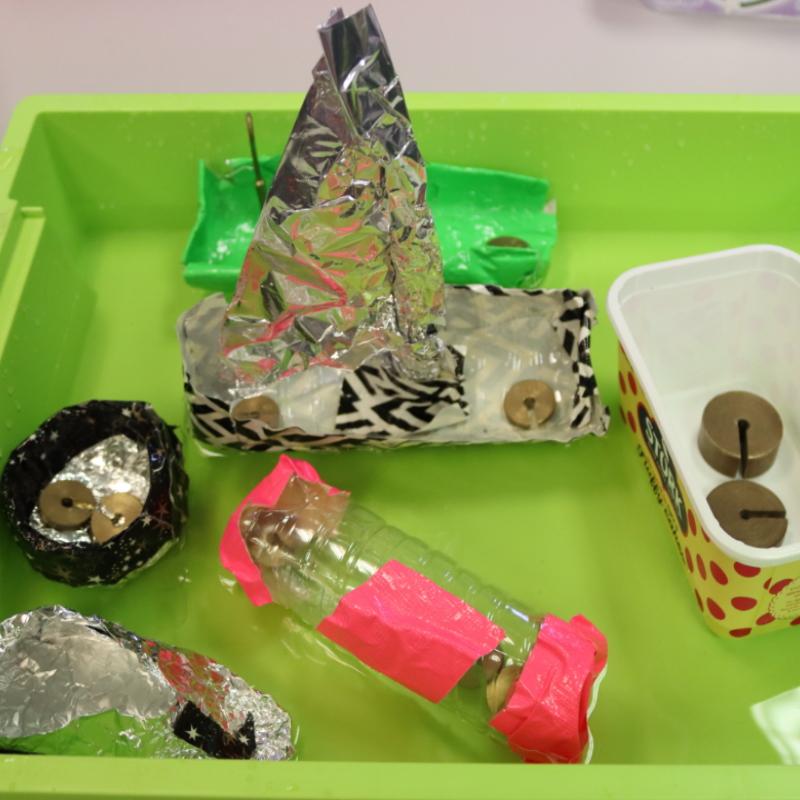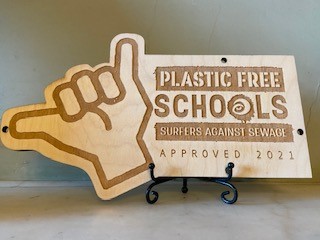Sophie Brace, Head of Science at Heath Mount School, discusses the impact her Partnership Grant has had on the school, her students and also on herself as a professional.

The inspiration
A group of pupils came to see me with what originally seemed like a bit of a crazy idea, they wanted to build a boat from plastic bottles. They had seen a video, ‘Richart Sowa's Island Made of Plastic Bottles’, where Richart Sowa lives an almost entirely sustainable life on a manmade island of plastic bottles which holds a house, allotment and garden. The island is only accessible by boat which, like the island, is built from bottles and sea trash. I could see why this was such an inspirational film for the pupils and why they would want to attempt to make a boat but I felt this should be more than a project for a small group of pupils when we could inspire the school.
I took the pupils initial idea of building a boat and developed a whole school project on investigating floating and sinking. The investigations were adapted for each age group to make them accessible for all pupils and with this plan I applied for a Partnership Grant so we were able to fund several activities across the school. As part of the Partnership Grant process, you need to work with a STEM partner and we as a school have been lucky to have Adrian from Airbus Defence and Space as ours. He has worked in several STEM careers and was fantastic in both giving his time and advice to us. Adrian helped us in developing the curriculum day and making a successful bio-plastic mixture. Many an hour was spent getting the mixture just right whilst discussing how to build a bottle boat.
The project
The school were introduced to the project with a curriculum day focused on plastics. There were a range of activities looking at how we use plastics, how much plastic is in the school, how to reuse plastic and how to make bioplastics. The pupils and staff were horrified by the number of hidden plastics within the school such as the ‘eco’ coffee cups having a plastic lining and the amount of single use plastic water bottles used in a week. With this the school encouraged the use of reusable water bottles, ideally the metal ones and mugs / reusable coffee cups for staff. Pupils recycled plastic bags into bunting and tried bag weaving, followed by trying to make their own bioplastics using a milk and vinegar mixture.
From this jumping off point we then used the science lesson time to start the floating and sinking projects but COVID struck and we went into lockdown! However, being resourceful and moving onto zoom lessons we worked from home with pupils building and testing their boats in bathtubs, pools, ponds and kitchen sinks from all around. This led to some fantastic scientific discussions about testing, repeatability, accuracy, and comparability as pupils discovered that it was difficult to compare the data from their results when they had used different types of masses in the boats. How can you compare a boat with toys with a boat with fruit in it? We found with the pupils working at home there was some fantastic collaboration with siblings across year groups and intergenerational collaboration with parents and grandparents joining in too. We had boat entries from parents and grandparents as well as the pupils’ own boats. It was truly wonderful to see intergenerational collaboration and having family members joining the science lessons.
Pupils developed their boats and changed designs to adapt the vessels so they were able to take more mass as we were looking at making the final design of the full-scale boat to be in the style of a kayak and to carry the head of maths down the River Beane. Lockdown finally ended and the pupils returned to school in phases with their boats. The pupils looked at the designs and grouped together those that they felt would work the best when scaled up. They took these designs and built them in a larger scale and tested them again. They repeated the process and decided on the final design which they then built in a full scale six-foot-long version.
Our STEM partner came in to help to the pupils with building the boat, critically questioning them about design and structure on a bi-weekly basis. When we had periods of time where pupils were working in year group bubbles and visitors were not allowed into school our STEM partner was brilliant at working with the pupils via zoom calls and answering questions via email. It really was all about adaptability in the face of adversity, we were very lucky that our STEM partner was willing to give up his time to answer emails and do zoom calls in his lunchtime to speak to the pupils.
Once the boat was complete the boat was tested in the school pool with the pupils. It withheld the trial run of five pupils sitting on it in the water, then the final test of a teacher paddling it across the pool, and it worked as a full-scale model of a kayak. So far it has not been tested on the River Beane due to restrictions with nesting birds, but it has been used in the school pool a few times and works brilliantly.
Sharing our work
As part of our Partnership Grant we wished to share our resources and offer CPD on running plastics curriculum days to other primary schools and prep schools. Sadly due to COVID restrictions this was not possible as a face to face option, so I took the CPD online and offered the workshops and CPD support online as zoom sessions via science and primary school social media outlets. This has been a great way to share resources and advice as the group sessions I have run have been small and also out of school hours, so they do not create cover in school time but also are more convenient for the teachers to attend and also for me to run.
The pupils’ awareness around the use of plastics has been increased through the plastics curriculum day and they wanted to be able to take this work further, so we looked to see how we could focus their energies in a purposeful way and took up the challenge of the Plastic Free Schools Award through Surfers Against Sewage education programme. Pupils were given a series of challenges including writing to our local MP and the Prime Minister about the impact of plastics on our environment, writing to large corporations such as McDonalds and Walkers crisps regarding the amount of plastic packaging they use. Taking on trash mobbing our local woodland and the River Beane. By July 2021 we had achieved Plastic Free Schools Status.

A group of our pupils presented the plastic boats floating and sinking project at the Royal Society’s Student Conference primary showcase in February 2022. This was an online session with other schools where our Year 7 pupils spoke about their project from planning, implementation to evaluation. They were peer reviewed by pupils from two other schools as well as Fellows of the Royal Society and invited guests. Our pupils loved the whole experience of being able to see and peer review other schools’ projects and also have their project reviewed. They felt it validated all their hard work not only with the boat but also with the other activities they had undertaken. It also gave them a chance to discuss and evaluate their science with their peers. They felt being able to speak to pupils from other schools was so wonderful as it is something they had not experienced before due to COVID restrictions.
At an ASE teachmeet in the spring term 2021 there was an opportunity to apply for Science on Stage, taking place in April of the following year. I felt this was a fantastic opportunity to share the plastics project to a wider audience and be able to share the resources we had developed through our Partnership Grant. The plastics project allowed me to gain a place on the UK delegation for the Science on Stage in Prague. Science on Stage is an amazing conference event with over 400 teachers from 36 countries taking projects from their schools that they have been working on. It is like the ASE conference in that you attend CPD workshops but everyone attending has a stall with their project. I was in Prague for four days talking about the plastics project, the Royal Society and Partnership Grants, promoting the idea that all schools benefit from the experience of having a STEM partner, being involved with outside partners (be it societies such the Royal Society or organisations such as STEM Learning) and how a small grant can have such a huge impact.
What the Grant meant to me
When I applied for our Partnership Grant little did I realise the impact it would have on my pupils, my school and myself. Personally I could not have ever imagined that I would have been running CPD sessions for teachers from around the country, supporting teachers to apply for grants and support, sending resources to teachers around the world – so far, our plastics project resources have gone to teachers in the UK, Australia, Europe and USA never mind going to Prague to Science on Stage and being part of an amazing team of delegates representing the UK and speaking about our project. From sharing the bottle boat project in Prague, I am now embarking on working with schools in Sweden, Hungary, Spain, and Italy on projects based on the plastics curriculum day and how it can be developed further.
I feel incredibly fortunate that I made the application for a grant and my pupils had come to ask to make a plastic bottle boat. We have taken a boat made of bottles and shared it far and wide, believe me when I say applying for a Partnership Grant can really change your science teaching opportunities. It has been a wonderful opportunity for our school and we would highly recommend that all schools just put themselves out of their comfort zone and apply for a grant for a project that does seem a little bit out there and a challenge to take on. Having a STEM partner means we have gained a new friend to the school; he is now staying on to work on a new STEM project with the younger years and we are looking at something else for the older pupils as well. What started as a ‘come along and work on one’ project has ended up as’ join our school for other activities too’. I nearly didn’t take on the challenge and look what my pupils and I would have missed out on.



